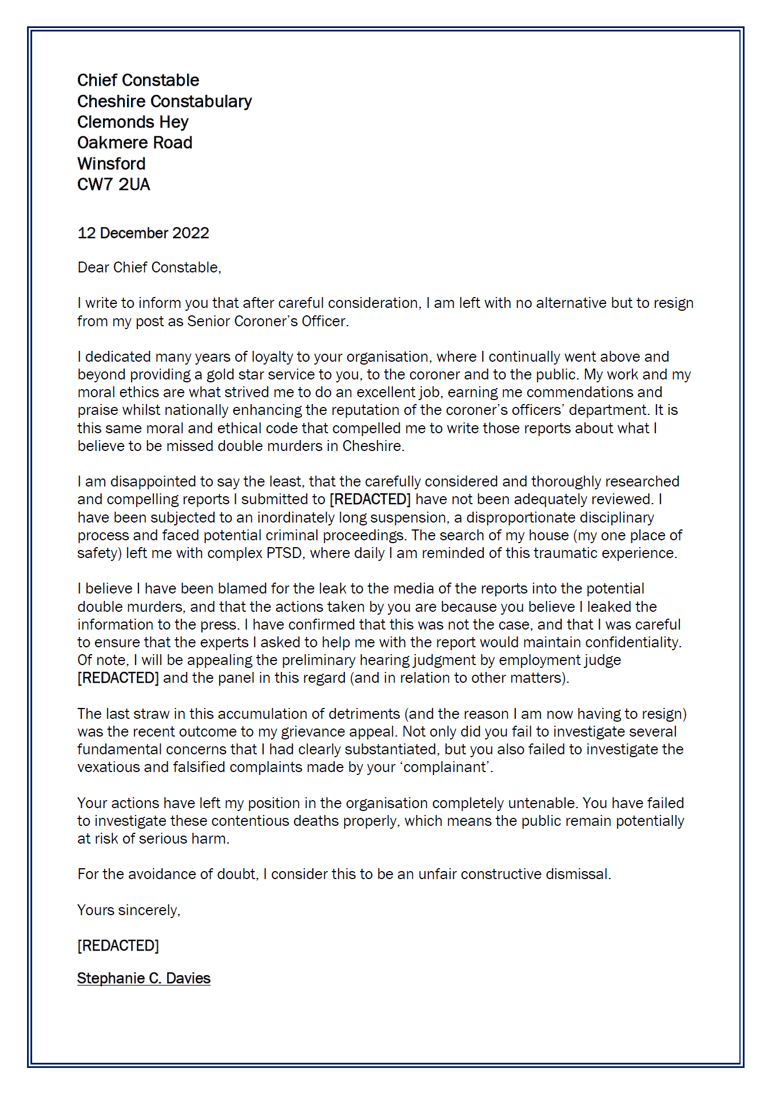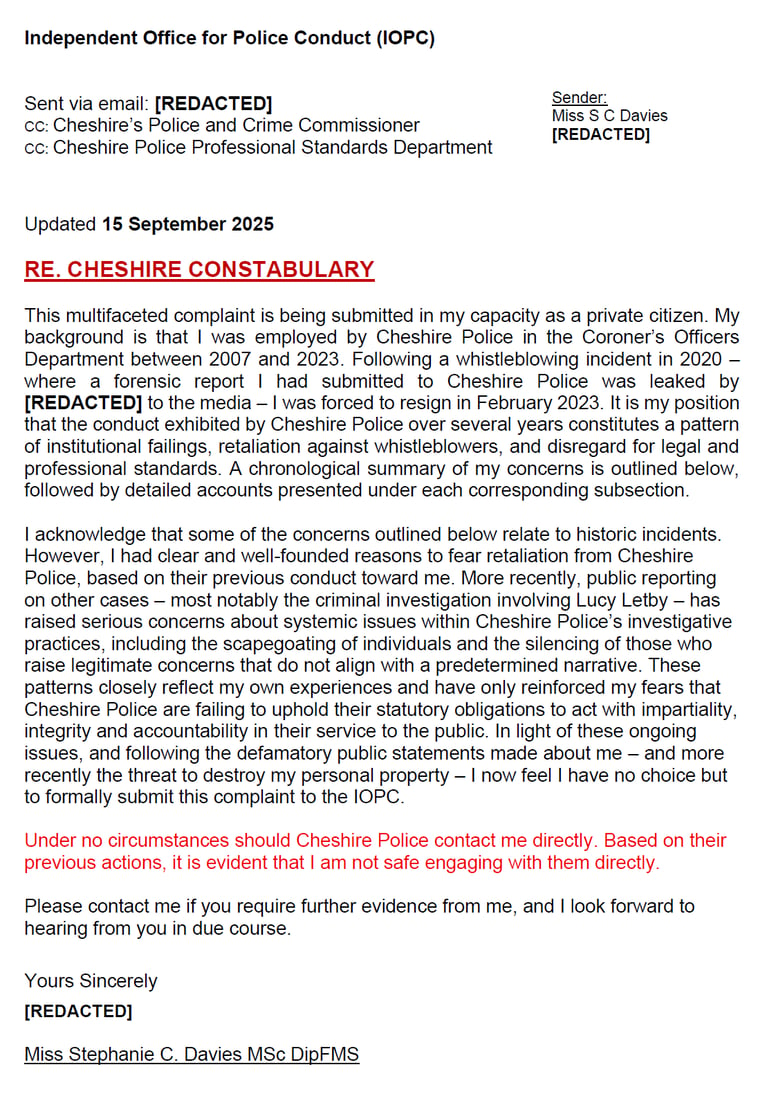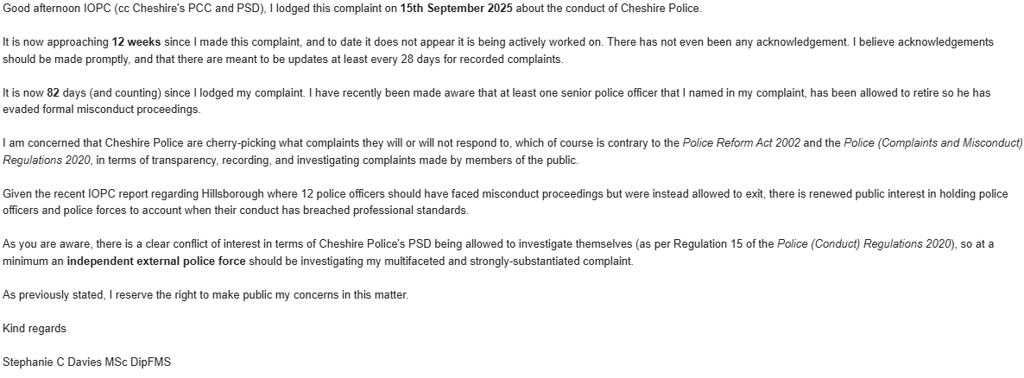Frequently Asked Questions


"I want to prove that my loved one was murdered. Will your case review definitely conclude murder, no matter what?"
My conclusions will always be substantiated and based on the available evidence. It is very possible that for your case, the evidence points to an accident or a suicide - and not murder or manslaughter. However, I may also find that the original coronial or police investigation had missed some key statements or evidential lines of inquiry. Equally, if I find the original investigations were at a good standard - I will acknowledge this in my review.
The same applies if I am requested to give evidence in court - I will only state what the evidence shows me, rather than 'shape' my answers to suit an adversarial side. My investigative style has always been inquisitorial and not adversarial - so I seek nothing but the truth.
"The Coroner's inquest did not say why my loved one took their own life, only how. Can you tell my why my loved one chose suicide?"
Coroner's inquests cover four things - who the deceased was, when they died, where they died and how they died. The remit of the inquest will often not look at why a person chose end their life, which can leave some families with more questions after the inquest has been concluded.
In 2019, I underwent Psychological Autopsy Investigation training in the USA - this looks at 'suicidology' and it helps to identify the risk factors and protective factors for suicide. I have also academically researched the aetiology of self-harming behaviour in two of my university dissertations. Added to this are the hundreds of suicide cases I have personally investigated on behalf of the police and the coroner over my coronial career.
In many genuine suicides, no notes are left and there can be no clues that suicide was considered to be an option by the suicide victim. My reviews can explore those hidden reasons a person may take their own life, and cover what the inquest may not have been able to cover.
"What do you charge?"
Fees are currently reduced whilst I am studying for my doctorate. Simple advice or initial consultations may not incur any fees, whereas more detailed case reviews will likely incur a fee (which are dependent on duration and complexity).
"Are there any cases that you may not be able to review?"
My expertise may not be able to cover medical negligence deaths, such as deaths in hospitals, care settings, in state detention or transport-related deaths such as Road Traffic Collisions or Air Disasters. These types of cases should already be closely scrutinsed via the coronial inquest or public inquiry process (and I can assist with this process) - but it is unlikely I would be able to conduct a complete case review as specialist expert input would also be required.
In addition, I may not be able to review cases where I have a conflict of interest. For example, given my history with Cheshire Police it would be inappropriate for me to review any cases where there had been Cheshire Police involvement. This way I can ensure I keep any potential cognitive bias to a minimum.
"What type of cases have you reviewed since you left the police?"
Since 2023, I have reviewed cases with the following causes of deaths:
Sharp force trauma
Blunt force trauma
Drownings
Toxicity
Asphyxiation
Gunshot wounds
Fire deaths and smoke inhalation
And the queries I have received, have included:
Concerns of third-party involvement
Concerns of incorrect manner of death determination
False confessions under police interrogation
Miscarriages of justice where an innocent person was incarcerated
Concerns with the inquest process
Concerns with the medical cause of death
Concerns with the police investigation
Concerns with the accepted sequence of events prior to death
Interpretation of post mortem and toxicology reports
Interpretation of the death scene
Requesting disclosure from the coroner
Learning why someone took their own life
Suspected staged / altered death scenes
"What do you mean by Staged Crime Scenes?"
This is where an offender alters or manipulates the scene to misdirect the police investigation. They do this as a method of getting away with a crime, so it forms part of their 'MO' (modus operandi i.e. method of operation). The reason they do this, is mainly because if the police work out what actually happened at the scene - they will likely work out who their principal suspect is. So it is often a suspect that is linked to the victim, that will stage the scene.
Research in staged crime scenes in the UK is pretty much absent, whereas the USA and the FBI I would say, are world leaders in this niche area of criminal investigations. I completed professional training in how to identify staged crime scenes in 2019, when I was taught by Arthur S. Chancellor in the USA. I am also studying this as part of my doctorate and how staged scenes and equivocal deaths may mislead coroners that are investigating deaths within their jurisdictions.
General Questions
"What do you mean by Equivocal Deaths?"
Equivocal deaths are cases where the Manner of Death can be attributable to a suicide, a homicide or an accident. The cause of death may be clear - for example a fall from height, sharp-force wounds, road traffic collision, or drug-related. The harder part is establishing the correct manner of death - this applies also to scenes that have been 'staged' by offenders. It is often those who are very experienced in non-suspicious deaths such as suicides or accidents, that can then spot that a scene has been staged as they know what factors are consistent or inconsistent in genuine suicides and accidents.
"What makes you different to other retired detectives or police officers who offer this type of consultancy service?"
Whilst I have worked alongside the police for many years, I have never actually been a police officer myself. The police by their very nature are adversarial - their primary objective is to look for evidence (or the absence) of criminality. They may not have the professional curiosity to establish how someone died - especially once they believe they have ruled out criminality.
During my coronial career I worked to the direction of the Coroner - who is inquisitorial and not adversarial. The coronial death investigation seeks the truth as to how a person came by their death - it does not look for a crime or to rule out a crime, and it certainly does not seek 'results' to suit a preconceived narrative.
What makes me different to other coroner's officers is the additional self-funded training I have undertaken, that would not typically fall in the remit of the coroner. For example I have been trained in bloodstain pattern analysis, wound pattern analysis, psychological autopsies, staged crime scenes, and advanced homicide investigation (which included training by FBI profilers, 999 call analysis, statement analysis, victimology factors, and interpreting offender behaviour at death scenes). Prior to becoming a coroner's officer I spent a month with NYPD attending scenes and learning how death scenes could be interpreted.

"I read that you lost your previous job with Cheshire Police. What happened?"
At the time I was the Senior Coroner's Officer employed by Cheshire Police, and I had reviewed two historic 'murder-suicide' cases from 1996 and 1999.
In 2018, I submitted a formal report to the Major Investigation Team in Cheshire Police about significant forensic concerns I had with the two cases in Wilmslow. Blood patterns and scene interpretations showed that these cases were actually double murders staged to look like murder-suicides.
Six months after I submitted the report to Cheshire Police, I was told that they had still not read my report due to being too busy. I was then given explicit permission to resubmit an updated version of my report, after I had consulted with experts (in bloodstain pattern analysis and staged crime scenes) in America.
Following my visit to America in 2019, I informed Cheshire Police that international forensic experts had also concluded that the deaths were double murders staged to look like murder-suicides. Their findings were consistent with my findings. Again, Cheshire Police failed to act on this information, but again I was given permission to keep working on my updated report.
It was in 2020, when a third-party decided to leak my updated report to the media, without my knowledge or permission. It was only when an article appeared in The Sunday Times that Cheshire Police finally decided to read both of my reports.
But instead of investigating my evidence-based concerns, they decided to investigate me.
The decision to investigate me as a criminal and for gross misconduct, was made by a senior police officer who was involved in the 1996 Wilmslow case - the same case where my review had criticised their investigation. This senior police officer failed to declare their conflict of interest when they made the order for my house to be searched and for me to be subjected to formal interviews under police caution.
I ended up submitting formal grievances against several Cheshire Police officers, over how I had been treated when I raised legitimate concerns with them, and how I was treated during their disproportionate investigation into me. I also took Cheshire Police to an Employment Tribunal, but ended up having to withdraw due to the negative impact it was having on my health.
In December 2022, my lawyer advised me to resign from the police as it was clear from my Employment Tribunal what the motivations of Cheshire Police were against me. I did not want to leave the job that I loved and excelled at (plus I knew I had not done anything wrong), but I was left with no choice but to resign.
Below is a redacted version of my resignation letter (click to enlarge):
Creating and sharing my reports on the Wilmslow cases with forensic experts
Cheshire Police have been aware since 2019 that I was consulting with forensic experts about these cases - in fact they gave me explicit permission to keep working on my report, despite knowing I was consulting with experts. The only reason I approached experts in the first place, was because Cheshire Police failed to read or act on the first report I had submitted to them in 2018 - at that time I advised them to appoint their own experts to review my findings, but they failed to do this. There is meant to be legal protection for employees who share information outside of their employment - as long as it is done in good faith, and that it pertains to exceptionally serious matters that the employer refuses to deal with. Missed and concealed homicides, associated with inadequate death investigations by the police, certainly fall into this category. This was not a breach of confidentiality.
Sending my report to a former Cheshire Police detective
I needed to sense-check my concerns with a former Cheshire Police colleague that I trusted. The report was sent without the photographs, and the personal details within the report were already in the public domain. My former colleague agreed the cases needed looking at again. This practice of sharing information with expert colleagues was standard and acceptable within the Coroner's Officers department. This was not a breach of confidentiality.
Forwarding a work email from a family to my university email address
This email was from a family member and I was concerned I would not be able to reply to them from work - as it was my last day in work before I made to go on paid suspension. This was done in good faith, from one professional email address to another professional one. It ensured that the query from the family member had been adequately dealt with, despite my planned absence from the office. This was not a breach of confidentiality.
Sharing a letter (that was addressed to me) with forensic experts
This letter was written in a very aggressive tone directed at me, by a 'complainant' whom I had never met before. I only shared this letter because I was concerned for my physical safety - and my experts agreed that I should be concerned. As soon as I received this letter, I had CCTV installed at home. This 'complainant' then went on do more things that directly targeted me, including writing to my university defaming me, and making defamatory statements about me on social media. I had no choice but to report them to the Anti-Stalking Unit in Cheshire Police. The Anti-Stalking Unit agreed that the initial letter by this complainant was concerning, but by then they could not (or would not) act on it because Cheshire Police 'Professional Standards Department' had already decided to use this letter against me and my professional conduct. This letter should have been treated as vexatious and the underlying motive for the letter should have been investigated further, but Cheshire Police instead decided to side with this individual in their campaign against me. This was not a breach of confidentiality.
Me replying to queries from the media
When the story broke about the Wilmslow cases, I was inundated with contact by the media - they were wanting televised interviews, documentaries and for me to publish a book. I knew I could not do anything with the media whilst still being employed by Cheshire Police, but I was brought up to treat everyone - including the media - with respect. So I responded to each query by giving a short, generic statement: "At this current time I am unable to speak about these cases, but maybe one day I can share my story". Of note, no money was ever discussed and I have since refused all payments in relation to the Wilmslow cases. At no time did Cheshire Police ever instruct me to not reply to media queries. In fact, they gave me no guidance whatsoever on how to deal with the media. This was not a breach of confidentiality.
Accessing a police incident log
For my role as the Senior Coroner's Officer, I was authorised and in fact expected to access all police incident logs pertaining to deaths or critical incidents that involved the Coroner. When the story about the Wilmslow cases broke, I was given this specific incident number separately by two senior police officers (Cheshire Police know who they are). The incident log related to the Wilmslow cases and the report I had written. When I was given this incident number, I took that to mean Cheshire Police had given me explicit consent to access and view the incident log. This was not a breach of confidentiality.
Having at my home address CSI images of a murder scene
I was given authorised access to murder cases in Cheshire, as that was part of my role as the Senior Coroner's Officer. I was informed by a senior detective that they "needed all the help they could get" regarding a murder case that was causing them issues. This same detective often asked for my help with cases they were dealing with, despite it being outside of my coronial remit - this was how I ended up with access to these images. Bearing in mind, this was during COVID and Cheshire Police had ordered for me and my team to work from home - so I had details of multiple cases at my home address as per COVID protocols. Cheshire Police failed to find anything incriminating against me when they searched my house, so they decided to use this as one of their allegations against me - despite me having legitimate reasons for having details of cases at my home address. This was not a breach of confidentiality.
Previous Employment


"What were the seven allegations of gross misconduct made against you?"
After I resigned, Cheshire Police decided to hold a disciplinary hearing in my absence. I had wanted to attend with my lawyer, but they blocked my lawyer from attending. I also requested that the hearing was held in public so that there was full transparency - but again this was refused.
The disciplinary hearing ignored all of my exculpatory evidence and they decided that I was 'guilty' of seven allegations of gross misconduct - all to do with confidentiality breaches.
I have summarised these allegations below, and included my responses to each. I will leave it to the reader to decide if the termination of my employment was justified.
"Are you a grifter?"
My understanding of a 'grifter' is someone who swindles people out of money... So if I was a grifter, would I have:
Completed my 170+ page review of the Wilmslow cases for free in my spare time? I even informed Cheshire Police that I was willing to remain anonymous whilst their detectives took the credit (if I turned out to be right). I wanted justice, not recognition or money.
Conducted my first ten independent case reviews entirely pro bono?
Insisted that my documentary fee for the Wilmslow cases was donated to my chosen charity? (It was donated to the Warrington, Halton & St Helen's RSPCA - charity number: 232259)
Ensured fees for case reviews remain low whilst I am studying for my doctorate?
Pledged to donate a percentage of my future earnings to charity?
One of the things that makes me different to other people, is my integrity and honesty. It was due to having these moral principles that I maintain led to the loss of my job - as it turned out my principles were incompatible with the police force that I used to work for.
"Have you EVER had any feedback from Cheshire Police about your concerns on the Wilmslow cases?"
No, I have not. Nor have they ever sat me down to talk to me about my concerns. I first raised concerns with them in 2018, and over seven years later - I am still waiting for feedback. I submitted formal written reports so that I could receive formal written feedback - but Cheshire Police have refused to give me any. At my Employment Tribunal in 2022, they confirmed that there has never been anything written down that resembles feedback.
The only update I have had was in March 2021, when Cheshire Police declared to the media that these cases "were still murder-suicides". I again asked Cheshire Police for specific feedback on my scientific analyses - but they refused to give me any.
I have recently raised this as a concern with the IOPC.
"Is it true that Cheshire Police wanted you to be charged with criminal charges?"
Yes it is. They submitted a 'file' to the CPS (Crown Prosecution Service) in relation to data protection and gross misconduct charges. This file was submitted under the direction of the senior police officer who was directly involved in the 1996 Wilmslow case (a major conflict of interest). The CPS threw it out, saying they were not interested in prosecuting me. Cheshire Police then APPEALED this CPS decision, but Cheshire Police lost this appeal.
Cheshire Police then wrote to me stating that if they found ANY evidence they could use against me, they would prosecute me.
"Why did you refer to the Operation Hummingbird cases as 'murders' in your Thirlwall Inquiry statement, when your review did not find any murders and you now think the convictions of Lucy Letby are unsafe?"
Once I had completed my review in 2017, I had no further dealings with Operation Hummingbird so I did not see the red flags until much later. The first red flag was the interpretation of the 'confession' notes - I was concerned these were misinterpretations of subjective behaviour. The second red flag was the appointment of the lead expert for Operation Hummingbird and what the scientific basis was for the new causes of death.
I put these red flags to one side once the 'guilty' verdicts were announced. I felt that there must have been evidence that proved guilt that I wasn't aware of - so I referred to the cases as 'murders' in my Thirlwall Statement. It was only when Cheshire Police returned my review to me, that I then started to question the verdicts. The evidence found by the new defence experts, is much more consistent with the review I did, and this new evidence points to the Lucy Letby case being one of the worst miscarriages of justice we have seen. I have offered to amend my statement to the Thirlwall Inquiry, but I have had no response from them. I have also informed the Cheshire Coroner of my concerns, who has acknowledged receipt of my letter.
In my view, there needs to be fresh inquests into these neonatal deaths. I have informed the Cheshire Coroner that I am willing to give evidence should new inquests be required.
"Is it true that Cheshire Police handed back to you, your Operation Hummingbird Review, after your employment had ended?"
Yes it is. After my employment ended with Cheshire Police, they handed to me three pre-packed boxes of my personal office effects. I later found that one of these boxes contained highly sensitive material pertaining to multiple deceased persons - such as post mortem reports, crime scene photographs, inquest files, email correspondence and original inquest exhibits. Amongst the items returned to me, was my Operation Hummingbird review that I completed in 2017 - and none of the babies names had been redacted (as per Court Order). That was when I realised that the hospital had failed to report Baby O's procedure to the Coroner.
I sent my 2017 review to the Thirlwall Inquiry, and I returned the remainder of the sensitive material to the Cheshire Coroner. I was concerned that should Cheshire Police decide to search my house again, they would use their own data breach against me. Arguably, this breach was worse than the one I lost my job over.
I recently reported this data breach to the IOPC.
"Is it true that Cheshire Police refuse to return your personal laptop?"
Yes it is. When they searched my house on 23 September 2020, they seized a number of my personal items. They eventually returned all but one item - my personal laptop. Of note, my report into the Wilmslow cases had already been deleted from my laptop when it was seized. Cheshire Police failed to find any incriminating evidence on my laptop - if anything, there was plenty of exculpatory evidence on my laptop instead.
When Greater Manchester Police investigated (part of) my grievance, they specifically instructed Cheshire Police to return my personal laptop to me - because there was no longer any legal basis for them to retain it.
Cheshire Police recently wrote to me, stating that:
(1) They would never return my personal laptop to me and
(2) They were now going to destroy it.
It's open to interpretation as to why they will not return my laptop to me. When I had supervised access to it at Cheshire Police HQ in June 2022 (for my Employment Tribunal), I found that 6 months of my sent emails (between March 2019 and September 2019) had mysteriously been removed from my laptop whilst it was in Cheshire Police's possession. Crucially these emails covered the time when I visited forensic experts in the USA about the Wilmslow cases, and when I informed Cheshire Police what those experts had said.
Cheshire Police stated in open court at my Employment Tribunal that they had 'no idea' how these emails had been removed from my laptop.
I recently reported the theft of my laptop to the IOPC.
After my disciplinary hearing, Cheshire Police wrote to me to say they had found me 'guilty' of all seven counts of gross misconduct and that they would have sacked me had I not resigned. They also stated that they had placed me on the College of Policing Barred List - this is to ensure that I can never find similar work again. This is the same list that corrupt police officers end up on.
Apparently, I can appeal being on this list after five years has elapsed. However, I can only be removed from the list if Cheshire Police state that I am no longer deemed to be a 'risk' to other police forces.
"What did you complain about to the IOPC (Independent Office for Police Conduct)?"
In September 2025, I sent the IOPC a 25-page complaint about Cheshire Police. It covered seven well-substantiated concerns:
1. Failure to act on or give any feedback about my concerns on the Wilmslow cases
2. Whistleblowing reprisal and failure to investigate evidenced senior police officer perjury
3. Unlawful retention and destruction of personal laptop
4. Failure to investigate serious police misconduct
5. Institutional pressure on academic progression
6. Data Protection breaches and mishandling of sensitive material
7. Public dissemination of defamatory and falsified information
The first page of my complaint can be viewed here (click to enlarge):
Click to download my timeline of key events:
"Why did Cheshire Police describe you being in an 'administrative role' in the Coroner's Office and that you did not have relevant 'medical or legal' qualifications?"
When asked for comment by the Guardian and Channel 4 News about what I had said about the Lucy Letby case, Cheshire Police released a statement saying that in the Coroner's Office I only had an 'administrative role' and that I did not have relevant 'medical or legal qualifications'.
I can categorically confirm that this is false, and Cheshire Police know that they have released false, misleading and defamatory information about me.
Of note, Cheshire Police have not denied that they requested me to do a formal review on the 13 neonatal deaths at the Countess of Chester 2015-2016, and that my review was one of the key reasons that Operation Hummingbird was launched.
There is evidence on the Thirlwall Inquiry website where a senior Cheshire Police detective stated (click to enlarge):
Source: https://thirlwall.public-inquiry.uk/wp-content/uploads/thirlwall-evidence/INQ0011611.pdf
In addition, to become a Cheshire Police Coroner's Officer in the first place, one of the essential criteria in their role profile is to have 'medical or legal' credentials. If I did not have the relevant credentials, I certainly would not have been offered the job in the first place.
My CV can be downloaded from my website, so I will leave it to the reader to decide whether or not I was suitably qualified to make comment on the Lucy Letby case.
I recently reported this defamatory statement to the IOPC.




As of January 2026: Cheshire Police will only investigate the last two of my allegations - the data protection breach and the defamation. They have chosen to ignore the first five allegations.
I have included this section so that there is complete transparency about what happened between me and Cheshire Police.
In short, I inadvertently embarrassed them when I raised valid concerns about mistakes they had made in previous death investigations.
Everything I say below, I can back up with evidence.
I chased this complaint on 6th December 2025 (click to enlarge):





